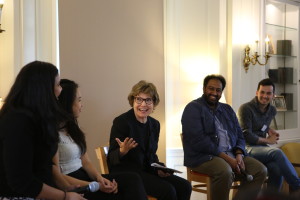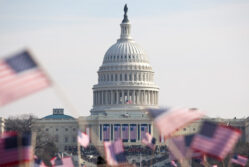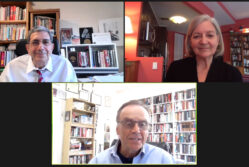Event Coverage Highlight

Panel Reflects on ‘Shifting’ Industry on World Press Freedom Day

Left to right: Tracy Jarrett, Justine Calma, Deborah Amos, Isma’il Kushkush and Ben Taub. Photo: Jay Espy / GroundTruth
As part of World Press Freedom Day on May 3, the OPC joined The GroundTruth Project and Freedom House for a panel discussion on the need for safety amid rising risks to journalists around the world.
Charles Sennott, founder and executive director of The GroundTruth Project, told attendees at the International House in New York that on average a journalist is killed somewhere in the world every two weeks. Two-thirds of those killed are murdered outright and one-third are killed while pursuing stories. Ninety percent are local journalists reporting in their home countries, and 90 percent are killed with impunity – with no prosecution or resolution to the crime.
A report from Freedom House released on the same day as the forum found that only 13 percent of the world’s population enjoys a free press.
Sennott spoke about shifts in the industry that have caused media to rely more heavily on freelancers. He called on news organizations to shoulder more responsibility for giving the freelancers they rely on training, safety and support.
“We live in a time of rising journalistic peril, but also we live in a time of limited resources, when the business models are challenged and when how we’re going to sustain journalism is a big question on the table.”
He touted the Global Safety Principles and Practices, a movement started by the OPC and other organizations in 2014 to foster worldwide protection standards for freelancers.
During an interview, Sennott asked veteran ABC News correspondent Bob Woodruff, who was seriously wounded while reporting in Iraq in 2006, to give safety advice to young journalists.
“Duck,” he joked. “It’s best to find local people who know the country well, know the neighborhoods well.”
The program included an afternoon panel, moderated by NPR correspondent Deborah Amos, with experienced young journalists.
Amos recalled her own experience covering violence in Beirut in 1982.
“Back then, almost all sides needed you to tell their story. So they were more mindful of your safety because they needed you. That has completely changed,” she said.
Ben Taub, the OPC Foundation’s 2015 Emanuel R. Freedman Scholarship winner and a contributor to The New Yorker who writes about jihadism in Europe and the war in Syria, urged young journalists to avoid running blindly into war zones.
“You don’t have to go to where the shooting is happening in order to cover the war. There are refugees coming out, and they know the war a lot better than you’re going to know just by showing up.”
Isma’il Kushkush, OPC Foundation’s 2016 Roy Rowan scholar, talked about reporting in his ancestral homeland of Sudan and working as a fixer in Darfur. He said while he was often able to blend in with local people more easily, he was also beaten and nearly killed when he was mistaken for a member of pro-government militia because of his ethnicity.
“It’s important to evaluate how you will be perceived,” he said.
Justine Calma, a GroundTruth reporting fellow, covers global health, climate change, gender and identity across the United States and Southeast Asia. Calma, who is Filipino American, talked about her experience reporting on sex workers in the Philippines, where ethnicity helped her blend in but also meant she could not go into brothels without a foreigner accompanying her.
Her team asked for help from a local colleague, who told them not to just barge into the sex workers’ territory, because they would be distrusted and might be seen as a threat.
“We had to rethink the way we were going to enter,” she said. “So I had to listen to others. That’s what I’ve learned.”
Tracy Jarrett, NBC News producer and former GroundTruth reporting fellow, pointed out that the hazards of reporting are not limited to conflict zones abroad.
She said that while covering unrest in Ferguson, Missouri last year, she found that being young and African American gave her access that colleagues didn’t have, but she still faced risks in the crossfire between police and protesters who targeted journalists covering the story.
“What happens when the rioters start shooting at and throwing things at the journalism compounds? You weren’t even safe in the safe areas that they set up for you.”



